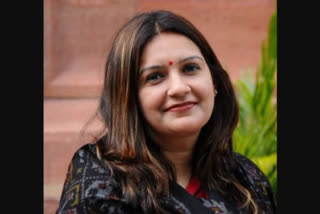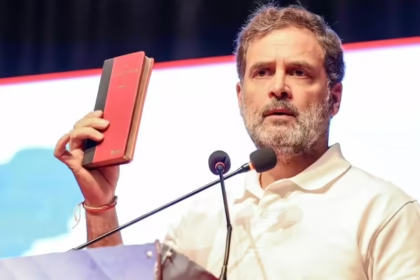Priyanka Chaturvedi Hits Back at Nishikant Dubey Over Raj Thackeray: “Who Made Him the Judge of Our Accents?”
Priyanka Chaturvedi, who represents Shiv Sena (UBT) in the Rajya Sabha, has fiercely retorted to BJP MP Nishikant Dubey’s recent jibe during the ongoing ‘Hindi versus Marathi’ controversy. Dubey had taken exception to remarks made by Raj Thackeray, accusing the MNS chief of undermining national unity and cultural harmony. In a fiery response, Chaturvedi posed a provocative question: “Who made him the judge of our accents?”—calling Dubey’s intervention both presumptuous and politically motivated.
The row began when Raj Thackeray, known for his staunch Marathi nativist stance, criticized the purported push for Hindi dominance in Maharashtra’s schools and public spaces. He ridiculed Hindi-speaking migrants, telling them, “We are Hindus but not Hindi,” a line seen as a critique of linguistic hegemony rather than religion. Dubey responded by accusing Raj of stoking regional divide at a time when unity is paramount. “He is playing politics with the soul of Maharashtra,” Dubey said, urging people to focus on national integration and harmony.
Chaturvedi didn’t mince words in defending Thackeray’s remarks. She accused Dubey of being the real troublemaker for trying to silence regional voices. In her statement, she challenged the MP: if Raj’s comments are disparaging, then who gave Dubey the authority to rule on what constitutes respect or insult for a language? “Accents are part of identity,” she declared, adding that Dubey’s attempt to police them reflects political insecurity rather than national solidarity.
This clash isn’t merely a linguistic dispute—it’s a microcosm of India’s broader tensions between centralisation and regional identity. Maharashtra, particularly post-Marathi Manoos movements, has long fought to protect Marathi culture and education. Raj Thackeray’s remarks and Dubey’s critique echo this historic struggle, now played out in the media’s spotlight.
Chaturvedi, who entered politics with Congress and later shifted to Uddhav Thackeray’s Shiv Sena UBT in 2019 , has experience standing her ground amid controversies. She noted that Dubey’s remarks don’t advance unity but undermine India’s diversity. She argued that accusing anyone of fomenting division over accents sounded hypocritical, stating, “Unity in diversity doesn’t mean uniformity in identity.” Her comeback in parliament and media rounds portrayed her as a leader who stands firm on principles rather than yielding to political pressure.
Observers say Chaturvedi’s rebuke did more than defend Thackeray—it reframed the debate. Instead of discussions about language as a source of division, she turned it into a question of governance and political overreach: Who decides what speech is acceptable? Her argument places individual and communal identity back at the center, resisting what she sees as top-down imposition of language norms.
What’s striking is Dubey’s framing of the issue as a national interest concern. He argued Raj Thackeray’s stance risked fracturing national unity and feeding cultural animosities. In contrast, Chaturvedi suggested his response was more about partisan politics than democratic discourse. She accused him of fearmongering, saying his message essentially told Maharashtrians, “Your identity is threat.” She reaffirmed her position that it is not accents that divide the nation—it is mistrust and political opportunism that do.
Cultural commentators suggest this spat highlights a pervasive political dynamic in India’s federal system. On one side, regional leaders advocate for local languages and customs, while national parties emphasize unity and cohesion, sometimes perceived as a push toward homogenisation. The delicate balance between regional pride and national identity becomes charged terrain, especially during election seasons.
For the public, the question is straightforward: At what point does raising concerns about regional identity amount to exclusion? Chaturvedi’s rhetoric reminds voters that acknowledging local culture isn’t the same as rejecting national unity. She reiterated that Maharashtra’s identity is an essential part of India’s mosaic, not a threat to it.
What makes Chaturvedi’s intervention significant is her authority in debates on gender, culture, and regional autonomy. Beyond the language war, she touches on democratic rights—chief among them the right to political expression without fear of policing or labeling as divisive. Her defense of regional identity is not just symbolic—it is a political stance that could resonate across states with strong linguistic and cultural pride.
As the debate continues, questions linger over what stands at stake. Will the Narendra Modi‑led BJP push a more centralised narrative of national identity ahead of elections? Will regional leaders like Raj and Chaturvedi double down on their cultural stances? And ultimately, will courts or constitutional mechanisms need to weigh in on whether political speech around language crosses a line into sedition or hate?
For now, Chaturvedi’s punchy rejoinder—“Who made him the judge of our accents?”—is a rallying cry. It asserts that language isn’t merely a communicative tool—it’s an expression of self, community, and continuity. And if Maharashtra, or any state, wants to preserve that richness, critics argue, so be it. That is the true test of a nation that promises unity in diversity—letting every accent speak its truth.
Also Read: Shubman Gill Playfully Trolls English Reporter in Post-Match Press Conference








